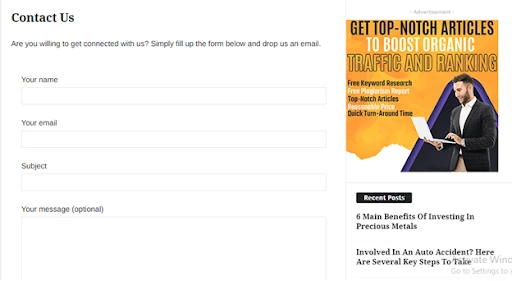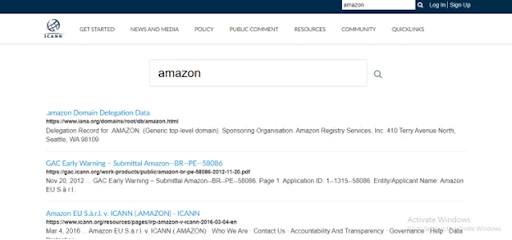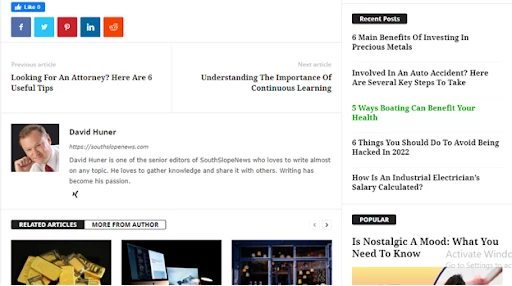
Are you wondering how to find the publisher of an article? The guide lists the methods you can use to get this information.
Finding the details of an article’s publisher involves looking at the right website places. For websites, the publisher is the page’s author or article you are viewing.
The publisher’s information is usually in the website’s footer or below the article/ page. If the information isn’t immediately clear, there are certain places on the website that you can explore for the publisher. Here are the steps on,
Here Is How To Find The Publisher Of An Article
There could be several reasons you want to find an article publisher’s name. Maybe the article has copyrighted information, and you want the publisher to take it down.
Or you have a benign need, like offering a suggestion. Whatever the reason, it is possible to find the publisher.
1. Check The Footer For Copyright Notice
It’s probably the first to look since it usually has the publisher’s details. On most websites, if not all, the copyright information is in the website footers. Reputable websites do include the copyright notice with their publisher.
2. Check The About, Contact Us, and Team Pages
These are some of the key pages of a website. The “About” and “Contact Us” pages are the most obvious places to visit.
On most websites, the about page has the details of the publisher, owner, etc. You can look at similar pages like “Our Story,” which is common on websites like eCommerce.
The bigger websites usually have dedicated pages with information about their teams. It includes details of the publishers, authors, and editor.
The contact page is also a great place to look; it usually has information that helps you get in touch with a website’s publisher. Contact pages will have an email address, contact form, or other contact details. You can reach them through the contact details and ask about the author of a particular document.
These pages usually have links from the website’s main menu. But if they aren’t there, you can look at the website’s footer or try manually navigating it.

3. Visit The Whois Database
The easiest and most direct way to find an article website is by consulting an official “Whois” database.
Most domain registrars offer the “Whois,” which will help you discover the domain name registration records. The most popular example of the “Whois” database is ICANN.
Amazingly the tool is free; you won’t need any signup. ICCAN maintains a repository and usually asks owners to keep their website information updated.
Enter the website’s domain name and click on the lookup for the details.

The Whois information can help you reveal the publisher’s details. Navigate to the contact section and look for admin, registrant, and tech details.
However, remember that most website publishers use domain privacy to hide crucial contact information from the public.
If the information isn’t fully available, check if the email in the contact section is working.
4. Check Out The Social Media
Today websites are present on various social media platforms. It helps them quickly and easily interact with their readers or customers. Check Facebook, Twitter, and LinkedIn for the website’s account/ page.
You’ll have to use some extra detective techniques if the information isn’t enough. You can do this by checking out their employees and other people who mention the website. You’ll surely find one or two employee profiles.
You can then privately contact them and ask for help getting the publisher’s information. Facebook also has a dedicated “about” section and urges publishers to keep their details up-to-date. Therefore you can find their contact information or verified email addresses in this section of their pages.
On Twitter, you can check to find out if they mention specific people. You should also explore their tweet to find out if they mention their author handles. The authors can help you find the website publisher.

5. Check The Website’s Legal Pages
Some websites have legal pages that disclose the official information about the business/ company and its operations.
The most popular legal page is the terms and conditions, which include the official details of their company registration.
A privacy and cookie page is another crucial page where publishers legally disclose their policies.
It also allows users to get in touch with the company or business. In summary, here are the legal pages you should look for on the website.

6. Look At The Authors Bio Section
The author’s bio section isn’t common in most articles. However, it’s popular in WordPress blogs and websites.
Websites with this page usually follow a standardized format when mentioning the author’s details. Most websites find the section towards the end of a page or article.
In certain instances, you might be lucky to find the author’s or publisher’s links in this section. You can use the information to contact them.

Why Find The Publisher Of A Website?
You might be looking for a website publisher for various reasons. Here are some reasons people are usually interested in finding a website publisher.
- Business Reasons: You might have a proposal or business idea that you want to pitch and then do business with the website. Therefore the publisher will be the best person to consult.
- Copyright Infringement Reasons: You can look for a website publisher to complain about specific content. For example, if they abuse your intellectual property such as copyright or trademark.
- Academic Reasons: You might need to contact the website publisher for correct citation or referencing in your academic essays. For academic reasons, you can use some automatic citation generators like QuillBot. It’ll help you site all information in the right format, including the author/ publisher.
How To Become A Publisher?
Becoming a website publisher is more than picking a name or buying an ISBN. There’s a whole process, though easy that you must follow.
However, you don’t need to own a business to be a serious author. Here is the process of building an amazing publishing career.
Familiarize With The Publishing Process
It would help if you learned everything about the publishing process to publish books or articles. That’s from editing to designing the article/ book interior and cover. With this knowledge, it’ll be easier to set up for print and eBook publication.
Choose a Business Name
The name should fit your business and be able to tell what the business is all about. Here is a simple idea, you can use your name and add the word publishing to keep it simple.
Alternatively, you can swap your name for something interesting that better fits your brand. All in all, you should choose a great name.
Choose Your Location
The state gives the article of organization for LLCs. Therefore you should pick the state where you’ll register your business. It’s advisable to pick a state where you live and work.
However, consider your state’s tax laws. You can register in a different state to save money if they are extreme and expensive. Note that it might also be impossible to register in a different state.
Choose business place
You can run the business from home to avoid office space rental costs. However, if your budget is great, you can rent an office space and set up the business.
If you’re planning to run a book publishing business, prepare to be busy. You can opt to do it all by yourself to reduce costs or hire a professional. Hiring a professional (on contract) won’t be so costly but will lighten your load and boost quality.
The Career Requirements To Become A Publisher
The good thing about a career in publishing is that it doesn’t require a degree. But if you want to prepare well, you can do a four-year degree.
The degree might be useful in other ways other than publishing. The ideal degree for a publisher might include:
- Marketing
- Journalism
- Business Administration
- Creative Writing
- English or the language you’ll use
- Communications
However, the most basic requirement for an aspiring publisher is an understanding of English. Alternatively, it can be the language you intend to use in publications.
You also need to know the ins and outs of the business. You can do this by finding an intern role in a publishing company; it’ll help.
The best publisher knowledge will come from working in the field. That can be in an established publishing company or as an author. Collaborate with others, creating, publishing, and marketing articles or books.
Conclusion
I hope the information in this article helps you find the publisher of an article. There are several places on the website where you can find the publisher’s information.
All you need is keenness and patience since you might need to do more digging than simply visiting pages. You can check out this video for tips on finding an article publisher.
